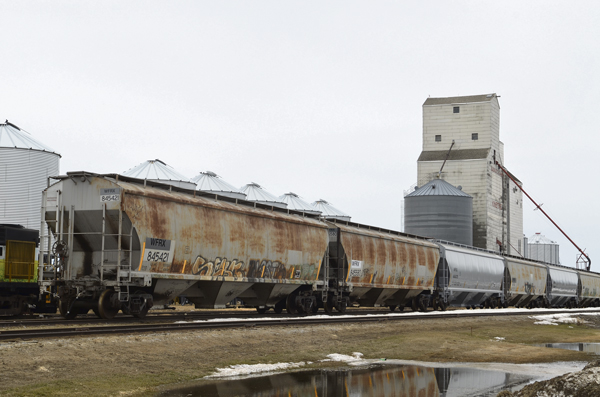Nutrien is shutting down its Rocanville potash mine for two weeks, citing the CN strike as the reason.
Nutrien announced the move Monday, saying it will be “forced to curtail production” due to the CN rail strike. Employee notices were sent out Monday indicating the mine will close for two weeks as of Dec. 2.
“It is extremely disappointing that in a year when the agricultural sector has been severely impacted by poor weather and trade disputes, the CN strike will add further hardship to the Canadian agriculture industry,” said Chuck Magro, Nutrien’s president and CEO in a press release.
“Any further disruption will be harmful to our business, the Canadian economy, and Canada’s competitive position and reputation as a reliable supplier of fertilizer and food. However, most concerning is the impact on our hundreds of employees for whom this creates great uncertainty and hardship leading up to the holiday season,” added Magro.
The Teamsters Canada Rail Conference (TCRC) began striking last Tuesday after contract negotiations with Canadian National Railway (CN) broke down. Over 3,000 conductors, trainspeople and yard workers are on strike.
The union is demanding a change to what it deems dangerous work practices and objecting to what it says is a move by CN to make it more difficult to take time off and make employees work longer hours.
“Fatigue has been recognized by the Transportation Safety Board as a major safety problem in this industry. Too many railroaders are operating trains when they should be resting,” explained the president of the TCRC, Lyndon Isaak in a press release
“For the safety of all Canadians, we cannot allow CN to make it even harder for our members to get the rest they need.”
The Teamsters are also objecting to a CN demand that employees accept a lifetime cap on prescription drug coverage. The union says that means workers and their families will be denied proper treatment for some forms of cancer, rheumatoid arthritis, diabetes and other diseases.
“Wages are not a major sticking point in these negotiations,” The Teamsters wrote.
CN is also requesting binding arbitration. The union is rejecting that call.
“CN is telling our members that they are facing tough times, but the reality is that they made over $3.8 billion in the third quarter of 2019. They should be ashamed to be pleading poverty,” Isaak said. “This obsession with profits and shareholder return, at the expense of just about everything else, is exactly what is wrong with our economy.”
Negotiations have been ongoing for seven months, with federal mediators involved for the past five. In September, workers voted 99.2 per cent in favour of strike action. The previous collective agreement expired in July.
CN issued a labour negotiations update Friday thanking its customer for support and patience and its team of “dedicated railroaders” for their professionalism during the labour dispute. The company has a small pool of managers allowing them to operate at about 10 per cent of normal service across its 22,000km network.
“Currently, very limited amounts of various commodities are moving across the country,” the company wrote in its statement. “This includes container traffic to keep Canada’s ports fluid to be able to return to normal operations after the strike.”
CN also renewed its call for TCRC to accept binding arbitration by a jointly-selected third party or by the Minister of Labour.
Teamsters rejected the update as “self-serving propaganda.”
On Monday, the Reuters news agency reported that in addition to the NUtrien mine shutdown, 70 employees at the CN Autoport facility in Halifax, which handles vehicles shipped in and out of Canada, would be laid off Thursday. That news reportedly came from Unifor.
On the west coast, the strike has slowed shipments to a crawl. Grain terminals in the Port of Vancouver’s Burrard Inlet operated by Cargill and Richardson International are normally serviced only by CN.
Wade Sobkowich, executive director for the Western Grain Elevator Association told Reiters a “trickle of cars” was reaching grain terminals, but they are “for all intents and purposes shut down.”
The strike was also discussed in the Saskatchewan legislature Monday.
NDP leader Ryan Meili asked the Saskatchewan Party why they were pushing the federal government to legislate the strikers back to work and not also pushing CN to negotiate an end to the dispute. Immigration and Training Minister Jeremy Harrison said the government’s preference is for negotiating a deal but binding arbitration or back to work legislation should be used if needed, according to the CBC’s Adam Hunter.
Over 100 teamsters were at the legislature for question period.
The federal government has resisted calls to legislate the strike to an end, instead affirming their belief in the collective bargaining process.


